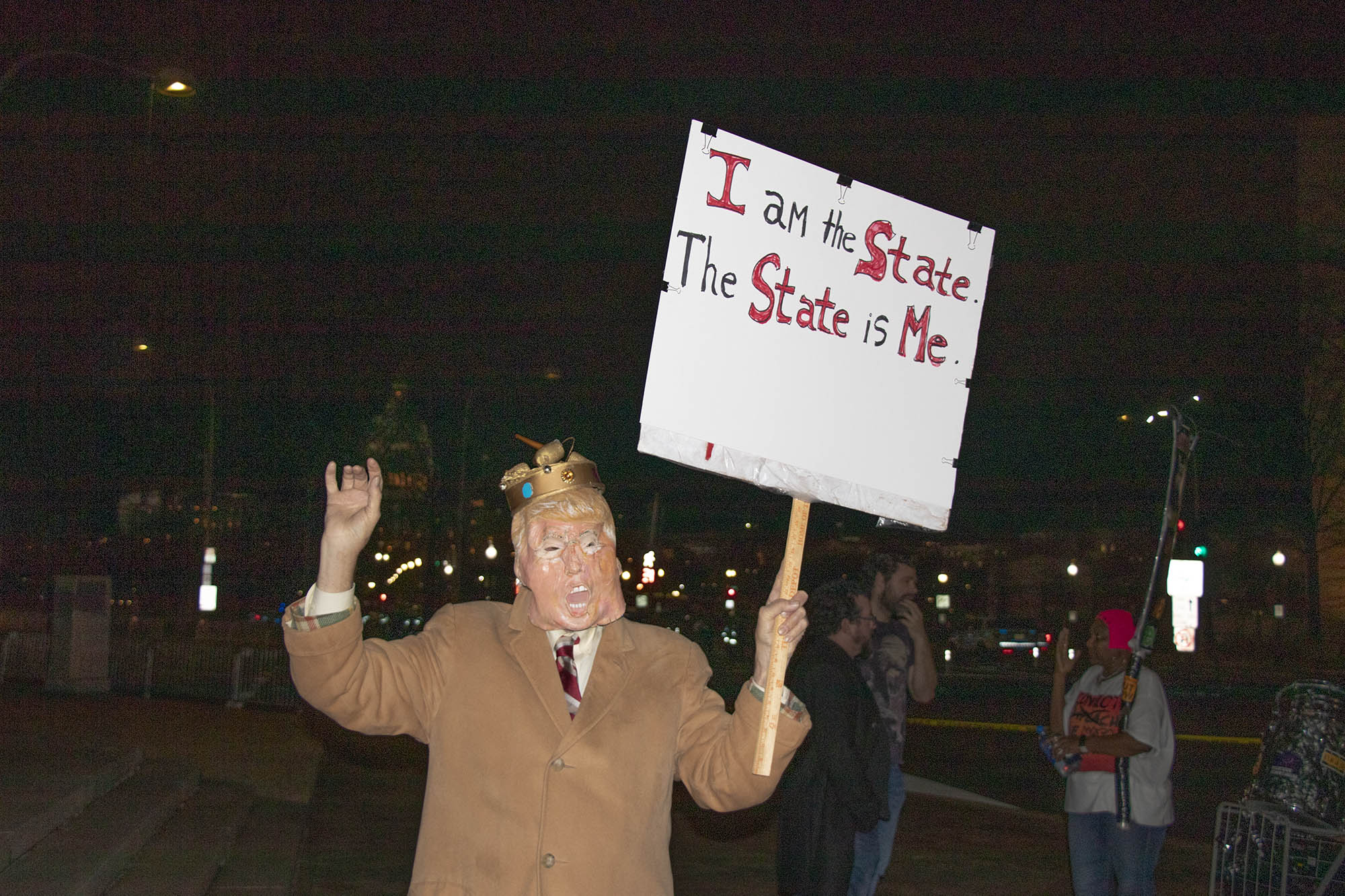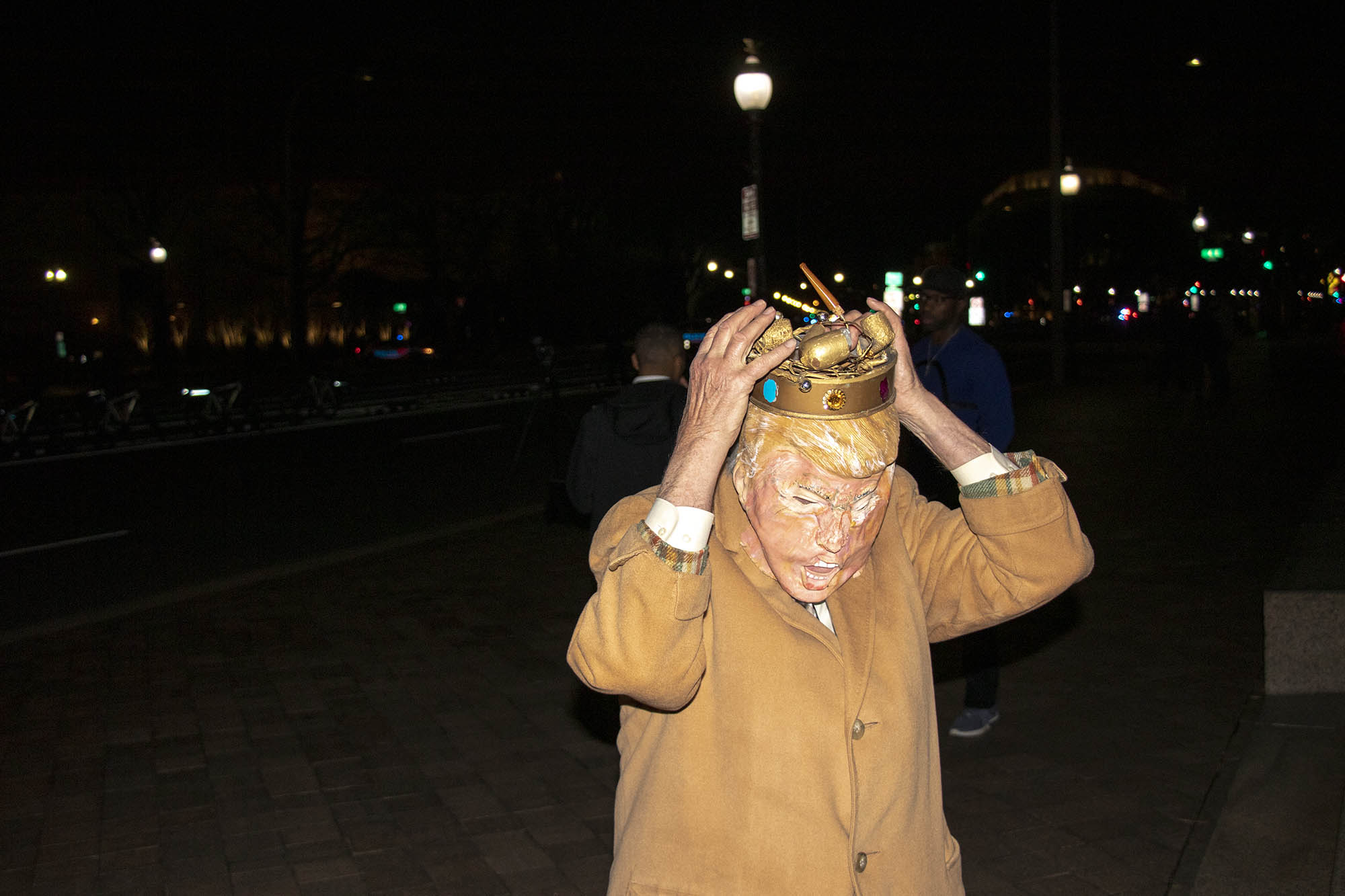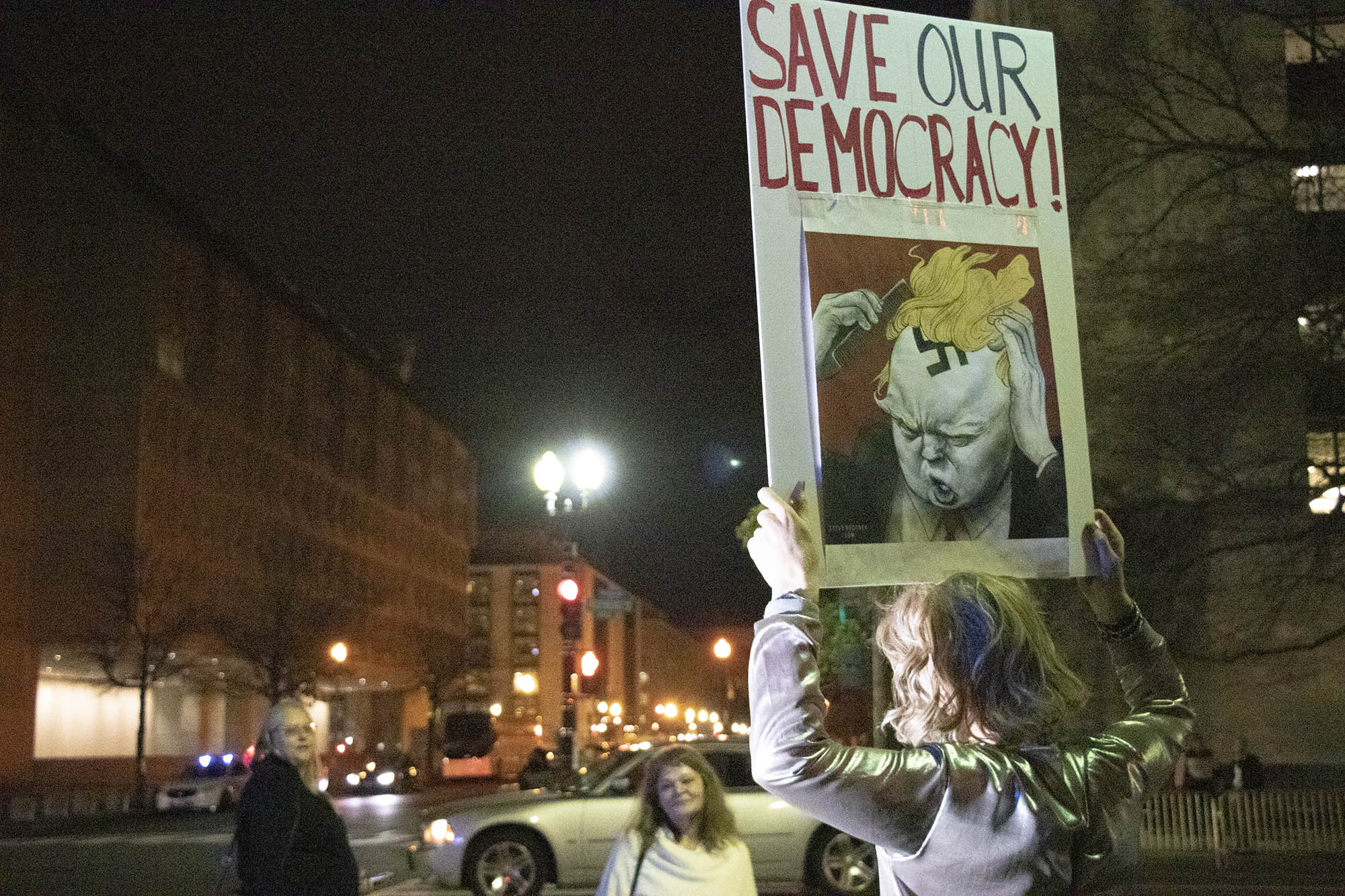SPECIAL REPORT: State of the Union 2020
Our team's special coverage of the 2020 State of the Union address
SOTU: Moments of Bipartisanship
WASHINGTON – While Democrats and Republicans Tuesday showed few signs of bipartisanship during President Donald Trump’s State of the Union address, there were a few moments where the two sides appeared to agree --- on criminal justice reform and increasing...
read more
Democratic response seeks to cast doubt on Trump economy
The Democratic response was delivered by Michigan Gov. Gretchen Whitmer, who is said to be the key to Democrats winning back the Rust Belt.
read more
Trump boasts a safer America, fulfilled border crackdown promises at State of the Union
Trump called Immigrations and Custom Enforcement officers heroic, eliciting screams of “yes” from the Republican lawmakers, with Democratic legislators looking on.
read more
State of the Union viewers found address to be bipartisan, despite contrasting predictions
Georgetown University students discussed the State of the Union at the watch party, while students debated the degree of partisanship on display.
read more
SOTU: The Economy
Trump spent the first part of his address to Congress touting the benefits of his administration’s economic policies for all Americans. He cited historically low unemployment and strong GDP growth while lauding new trade deals, tax cuts and deregulation.
read moreSOTU: Family Leave and Education
WASHINGTON — President Donald Trump said Tuesday he will prioritize supporting working families by mandating paid leave and lowering barriers to education. Members of Congress from both parties said they agree with the sentiments, but disagree on how to implement the policies.
Trump’s statements on family leave came in the wake of a December 2019 law that guarantees up to 12 weeks of paid leave to roughly 2.1 million federal employees. The law was the first update to the 1993 Family Medical Leave Act, which protects workers from being fired for taking unpaid family leave.
Trump called on Congress to pass the Advancing Support for Working Families Act, a bipartisan bill that offers a loan to new parents, repayable through reductions to their Child Tax Credit.
Critics say the bill only provides leave to new parents, though over 70% of those who use paid leave need it to care for loved ones who are ill or injured. Rep. Raja Krishnamoorthi, D-Ill. said a tax credit system would disproportionately hurt the working class.
“The problem is for certain folks, who are at the lower end of the income spectrum, tax credits aren’t going to be as useful,” Krishnamoorthi said.
Democrats have instead proposed the FAMILY Act, which would levy a 0.4% payroll tax on all families to fund paid leave programs. This would apply to new parents or those taking care of sick family members.
Trump also called on Congress to enact school choice legislation, which would allow parents to send their children to alternative public schools or private schools if they feel the traditional public schools in their area are not meeting their needs. Trump’s Education Secretary, Betsy DeVos, has long been a proponent of school choice.
Philadelphia resident Stephanie Davis and her fourth-grade daughter Janiyah were in attendance Tuesday night. According to a White House statement, Janiyah has been assigned to a “low-performing school” and is one of an estimated 50,000 students on a waitlist for a tax credit scholarship.
Trump says Janiyah is an example of a student who he believes has been harmed by anti-school choice policy — Pennsylvania Gov.Tom Wolf vetoed a school choice bill in June 2019.
“For too long, countless American children have been trapped in failing government schools,” Trump said. “The next step forward in building an inclusive society is making sure that every young American gets a great education and the opportunity to achieve the American Dream.”
At a White House “school choice roundtable” in December, Trump said children who were “trapped in failing government schools” would be “forgotten no longer” in his administration.
In February 2019, Sen. Ted Cruz, R-Texas, and Rep. Bradley Byrne, R-Ala., introduced the Education Freedom Scholarship bill, with backing from DeVos. The policy would direct $5 billion annually into locally controlled scholarship programs that promote school choice policies.
Trump touted the bill Tuesday night, saying it would give 1 million American children the opportunity to attend the school of their choice.
Critics of school choice, however, argued that such policies would deprive public schools of the resources they need to be successful.
“Remarks about how schools are failing is tragic because when you’re defunding schools,” former Rep. Katie Hill, D-Calif., said. “Calling it school choice is a misnomer. It’s just another way of saying we want to hand over a public service to for-profit communities.”
SOTU: National Security
WASHINGTON — President Donald Trump emphasized U.S. foreign relations in Latin America and the Middle East on Tuesday in his State of the Union speech, but failed to mention any concerns about Russia and North Korea.
“In general, it’s been a pretty light speech on foreign policy, which I mean, is to be expected of the State of the Union,” said Eric Gomez, a policy analyst for defense and foreign policy studies at the libertarian Cato Institute. “But still, compared to previous years’ speeches, what he chose to focus on was surprising.”
Trump devoted considerable time to Venezuela. The president said he “is leading a 59-nation diplomatic coalition against the socialist dictator of Venezuela, Nicolás Maduro.” Trump called Maduro an “illegitimate ruler, a tyrant who brutalizes people.”
Maduro’s main political rival, Juan Guaidó, was a surprise guest in first lady Melania Trump’s box during Trump’s address. The Venezuelan National Assembly declared Guaido the acting president last year. Trump also supported Guaidó during last year’s State of the Union address when he officially recognized him as Venezuela’s interim president.
For the past two weeks, Guaidó has been on an international tour rallying support of world leaders in his fight against Maduro’s regime, and his presence at the State of the Union marked one of his last engagements before returning to Venezuela.While the president’s speech focused on Latin America’s undemocratic regimes in Venezuela and Cuba, there were no remarks about U.S. tensions with North Korea and Russia, perhaps because there was no progress in negotiations with the two countries, said Gomez.
“I do wonder if Latin America is going to become a bigger focus [of U.S. foreign policy] now,”said Gomez.
Trump also addressed tensions with Iran and Afghanistan and said he is “working to end America’s wars in the Middle East.” The president criticized the war in Afghanistan, saying that he does not want more innocent Afghans to die and that the U.S. should not “serve other nations as a law enforcement agency.”
“These are warfighters, the best in the world, and they either want to fight to win or not fight at all,” said Trump. “We are working to finally end America’s longest war and bring our troops back home!”
To critics, Trump’s policies in the Middle East have been inconsistent. While the president says he wants to end wars in the region, some of his actions, such as ordering the killing of Iranian Gen. Qasem Soleimani, have escalated tensions with Iran and increased the likelihood of war.
“Iran’s going to continue with its own pressure campaign to force the U.S. to lift the new sanctions that Trump has put on,” said Gomez. “I think they’re going to further inch towards a nuclear weapons capability.”
Trump defended his actions against Iran during his State of the Union address, calling Soleimani “a monster who murdered or wounded thousands of American service members in Iraq.”Trump has mentioned Iran in all of his State of the Union addresses, calling the foreign entity the “leading state sponsor of terror” during last year’s speech.
The president also had as a guest Kelli Hake and her son ,Gage. Hake’s husband, Army Staff Sgt. Christopher Hake, was killed during an Iranian airstrike in Iraq ordered by Soleimani.
Partisanship on display, as Trump paints positive image of first term
WASHINGTON — In his third State of the Union address, President Donald Trump presented a positive vision of his administration’s first term while illustrating the depth of the partisan divide in Washington.
“Three years ago, we launched the great American comeback,” Trump said. “Tonight, I stand before you to share the incredible results. Jobs are booming, incomes are soaring, poverty is plummeting, crime is falling, confidence is surging, and our country is thriving and highly respected again!”
Republicans coalesced behind the president in Tuesday’s address, chanting “four more years” as the president took the lectern and rising frequently for standing ovations that pushed the president’s speech past 80 minutes.
Delivered one day after the Iowa caucuses, the president’s speech was a laundry list of his first term’s accomplishments, making his argument for re-election, not unusual for such addresses. Trump focused on a range of fiscally and culturally conservative issues, from what he call his strong border enforcement and support for the Second Amendment to job creation and the high number of federal judges – 187 — confirmed under his administration.
From the beginning, when Trump seemed to ignore House Speaker Nancy Pelosi’s extended hand, to the end, when Pelosi ripped up her copy of the president’s remarks, partisanship ruled much of the evening. While Republicans clapped and cheered repeatedly, Democrats largely remained seated and silent throughout much of the proceeding.
As the president called for bipartisan legislation that would dramatically lower prescription drug prices, many Democrats stood up, holding up three fingers — a reference to H.R. 3, ta bill to lower drug prices that the House passed in December. Senate Majority Mitch McConnell has not set a vote for it in the Senate.
The president delivered the speech at an interesting point in any presidency: on the eve of his expected acquittal in the Senate impeachment trial and, with the presidential election nine months away, on the heels of a recently released January Gallup poll showing the highest approval rating of his first term, at 49%.
With Tuesday’s address, Trump became only the second president to deliver a State of the Union while facing impeachment charges. President Bill Clinton gave his 1999 address amid his Senate trial for charges of perjury and lying under oath; he was acquitted the next month. Trump took a page from Clinton’s book, ignoring the vote on his charges scheduled for Wednesday, with acquittal in the Republican-led Senate highly likely.
Trump’s special guests, sitting in first lady Melania Trump’s box, put a face to the president’s vision of the country, with many doubling as a validation of his policies. The president pointed out the widow and son of an Army staff sergeant killed by ordinance ostensibly supplied by Iranian commander Qasem Soleimani, who was killed in a missile strike authorized by Trump last month; a longtime Border Patrol agent recently promoted to second-in-command of the agency; and multiple beneficiaries of “opportunity zones” where tax advantages are offered for investment in low-income areas.
A surprise guest was Juan Guaidó, head of Venezuela’s National Assembly who declared himself the interim president of Venezuela last January, shortly after President Nícolas Maduro took office. Tens of thousands of protesters took to the streets, calling Maduro’s election unconstitutional, and many countries backed Guaidó’s resistance, recognizing him as the leader.
“Mr. President, please take this message back to your homeland,” Trump said. “All Americans are united with the Venezuelan people in their righteous struggle for freedom.”
The address also prominently featured conservative radio talk show host Rush Limbaugh. The president awarded Limbaugh, recently diganosed with Stage 4 advanced cancer, with the Presidential Medal of Freedom and the first lady hung it around his neck.
For more details on Trump’s policy proposals in the State of the Union address, read the stories below.
Passionate but few protesters at Capitol for SOTU
WASHINGTON — A sparse group of protesters hung around the street corners in front of the Capitol Tuesday to show their opposition to President Donald Trump as he delivered his third State of the Union address.
In years past, larger groups met the president when he arrived at the Capitol for the annual address, but on this mild Tuesday night activists were outnumbered by curious tourists, commuters and cops.
Protests outside the Capitol draws small crowd with big message from Medill Washington on Vimeo.
David Barrows, one of the small band of demonstrators, said he frequently dresses to impersonate Trump to protest the president’s policies. His sign read, “I am the state, the state is me,” a reference to French monarch Louis XIV.
“The Republicans are so corrupt that he’s basically king, he can do what he wants,” Barrows explained. He blamed the low turnout at Tuesday night’s protest on a lack of communication from activist organizations.
Other protest regulars included activist rock band The Resistance Company and Nicky Sundt, a Washingtonian who described herself as a “transgender climate expert” and said she has attended over 40 demonstrations in the last three years.
But not everyone present had a lengthy resume of activism. Inspired by the House impeachment vote and Senate impeachment trial, Mark Glowshen of San Francisco said this State of the Union marked his first protest ever.
“I’ve been sitting on my butt for the last four years, watching this all unfold, just waiting for someone to do something. I finally ran out of patience so I came over here,” Glowshen said. “You want to deny truth on Fox News, that’s fine, but when you’re doing it on the Senate floor … that’s when I start to get really scared.”
As Sundt and the other protesters waited for the president’s motorcade to arrive at the Capitol, two women passersby asked for a picture with Sundt and her poster, which said “Save Our Democracy.”
“I wish we could stand here, too,” one of them said.
“That’s OK,” Sundt said. “It only takes one person to hold the sign.”
School choice, religious liberty argued before SCOTUS
WASHINGTON— The Supreme Court’s conservative majority seemed to favor proponents of religious schooling during oral arguments on Wednesday by allowing parents to spend government tax credits on private religious education.
The case, Espinoza v. Montana Department of Revenue, concerns Kendra Espinoza and two other mothers whose children attended a nondenominational Christian school. In past years, they had received a $150 state tax credit toward the private school tuition, but the Montana Department of Revenue decided that the scholarship program would no longer apply to religious schools after the current school year.
Taking the state’s decision further, the Montana Supreme Court ended the tax credit program altogether, citing problems in tracking where the tax credits were spent.
Lawyers for the mothers argued that because nearly all of the tax credits went to tuition for children attending religious schools, the state Supreme Court decision amounted to discrimination on the basis of religion and violated the Equal Protection and Establishment Clauses of the Constitution, which bar the government from discriminating against certain people or favoring a certain religion.
Richard Komer, counsel for the three mothers, also said the tax credits were given to the parents, not directly to religiously affiliated schools. That means Montana discriminated against the parents based on their religious beliefs, Komer said.
Thirty-eight states have constitutional provisions barring the allocation of government funds to religious schools that could be challenged if the court agrees with the plaintiffs.
Justice Brett Kavanaugh raised concerns that these provisions are so-called “Blaine Amendments,” enacted to discriminate against Roman Catholics in the 19th century.
Espinoza’s lawyers and several of the justices also compared the situation to what they saw as a clearer violation of the Equal Protection Clause — differences in funding on the basis of race.
“If the court had shut down the program because it included Muslim schools or African-American schools, there’s no question that would be unconstitutional,” said Jeffrey Wall, principal deputy U.S. solicitor general, who spoke in support of the mothers.
However, the lawyer for Montana said the state did not end the program on the basis of discrimination against religious people.
Unikowsky also disputed the idea that race and religion could be thought about in the same way with regard to discrimination.
“The Equal Protection Clause embodies a judgment that race is never, ever a permissible criterion in any government decision-making at all… and I don’t think the rule is the same in religion,” he said.
Calling for “New American Moment,” Trump reaches across the aisle
WASHINGTON — Facing political turmoil and historically low approval ratings, President Donald Trump stressed unity and bipartisanship in his first State of the Union address, appealing to Americans’ sense of civic duty and proposing new infrastructure projects across the country. He appeared strident on some issues, calling to keep the Guantanamo prison open and warning that North Korean nuclear missiles could “very soon threaten our homeland,” but he extended an olive branch to his opponents on others.
Envisioning Americans “together, as one team, one people,” Trump also call on Democrats and Republicans to work together to pass immigration and infrastructure legislation.
“I am extending an open hand to work with members of both parties, Democrats and Republicans, to protect our citizens, of every background, color and creed,” he said.
No modern presidents have faced such political firestorm in their first year. In the month leading up to the historic address alone, Trump has come up against a government shutdown, a bestselling book allegedly exposing secrets of his administration, and a request by FBI Special Counsel Robert Mueller to interview the president. Trump’s approval rating sits at 39 percent, almost 10 points lower than Barack Obama and 41 points below George Bush at the one-year marks of their respective presidencies.
With Republicans in full control of the federal government, Trump noted the key wins his administration has notched — overhauling the tax code, rolling back regulations, the appointment of conservative Supreme Court justice Neil Gorsuch and twelve circuit court judges, a record for a first-year president.
In what was arguably his most-watched appearance of his presidency, Trump tried mightily to win bipartisan support on the Hill for proposals that will need it.
Referencing his immigration reform framework and border security, the president said he aims “to defend Americans … and their right to the American Dream.” The president outlined a four-pronged plan that would create a path to citizenship for nearly 2 million immigrants, some of which are enrolled in Deferred Action for Childhood Arrivals program, set to expire in March.
The plan also calls for $25 billion in federal funding for a border wall and significant changes to legal immigration programs. Trump called the proposal a “fair compromise,” where neither party gets “everything they want, but where “our country gets the critical reforms it needs.”
Speaking to reporters after the speech, moderate Rep. Charlie Dent (R-PA), said Trump’s principles for immigration lay the foundation for a fruitful negotiation. Dent said Trump was right in talking about “legalization and ultimately citizenship for the ‘dreamer’ population.”
“I believe that there is a bipartisan path forward on immigration and border security,” he added.
House Minority Leader Nancy Pelosi, (D-Calif.), said the proposals aim “to make America white again.” Dozens of Democratic lawmakers brought “dreamers” as guests. Trump’s mention of “chain migration,” meanwhile, brought several boos from the left side of the chamber.
Rep. Joe Kennedy III, D-Mass., emphasized the Democratic party’s commitment to protecting DACA recipients in his party’s official response to Trump’s address.
“To all the Dreamers watching tonight, let me be absolutely clear,” he said. “We will fight for you.”
Infrastructure is an area where Trump may have a better chance at gaining bipartisan support. He promoted his $1.5 trillion infrastructure improvement plan, saying it’s time to “rebuild our crumbling infrastructure.” Trump said he is asking both parties to join together “to give us the safe, fast, reliable and modern infrastructure our economy needs and our people deserve.”
The plan to repair roads, bridges and transit systems allocates 25 percent of the anticipated $200 billion to rural infrastructure grants that have no federal requirements, allowing state and local governments to decide how best to use the money. The plan also requires that no individual state can receive more than 10 percent of the amount available.
“We will do it with American heart, American hands and American grit,” he said.
Before laying out his proposals on immigration, infrastructure and the military, Trump claimed credit for a robust economy. He touted high wages for workers and a relatively low unemployment rate, citing the 2.4 million new jobs generated since his election.
“Since we passed tax cuts, roughly 3 million workers have already gotten tax cut bonuses – many of them thousands of dollars per worker,” he added.
The president’s critics and supporters dispute how much credit he deserves for the country’s economic growth over the past year. Trump said unemployment claims have reached a 45-year low, but the declines in these rates continue a long downward trend that began before Trump’s presidency.
The speech was particularly light on environmental issues and climate change, although he did claim to have “ended the war on American energy” and “the war on beautiful, clean coal.”
President Trump also pointed to his next big economic push — trade. Last week, he spoke at the World Economic Forum in Davos, Switzerland, encouraging foreign companies to invest in America.
“America first is not America alone,” he told the crowd.
But in the House chamber, Trump embraced his protectionist roots, blasting “unfair trade deals that sacrificed our prosperity and shipped away our companies, our jobs and our nation’s wealth.”
On defense, the president claimed that “rivals” like China and Russia challenge not only the U.S. economy but also American values. He said the country must be prepared to confront “rogue regimes” and terrorist groups, which begins with Congress’ full funding of the military and modernization of the country’s nuclear arsenal.
“Past experience has taught us that complacency and concessions only invite aggression and provocation,” he said. “I will not repeat the mistakes of the past Administrations that got us into this dangerous position.”
What little comity the speech might have engendered will be likely short lived. Even in the hours preceding the speech itself, controversy raged over the Justice Department’s Russia investigation. The president’s attorneys argued that special counsel Robert Mueller’s team does not have sufficient cause to interview a sitting president face to face.





